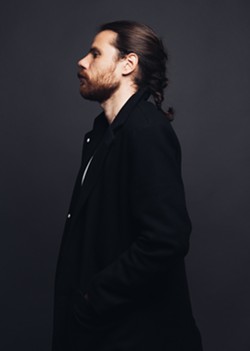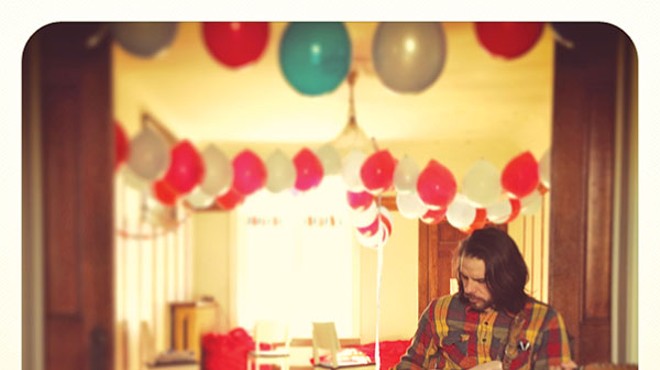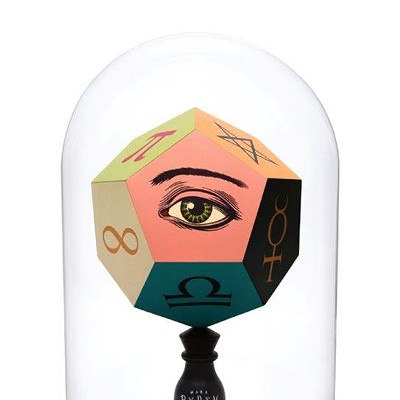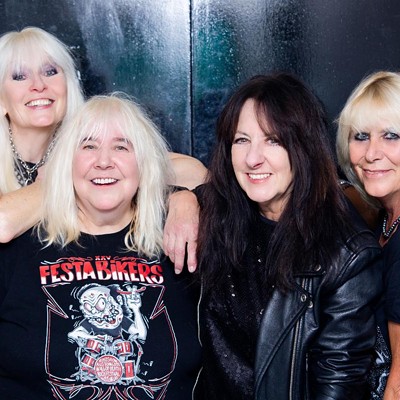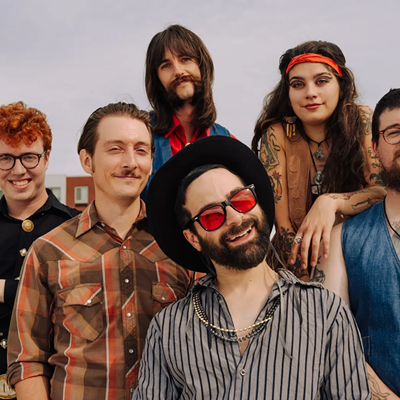Wednesday, January 7, 2015
Bahamas' Afie Jurvanen talks guitar, songwriting and Toronto
Afie Jurvanen, the Toronto musician known as Bahamas, plays Club Cafe next Wednesday night. We ran a short, edited version of my chat with him in today's paper, but it was so good, I wanted to release a less-abridged version here on FFW>>. The show wasn't sold out yet when we talked, but as of today it is, so if you haven't gotten your tickets yet, sorry!
What was the idea behind the name of your latest album, Bahamas is Afie?
I think the idea was just a way of acknowledging my name in the music, and I felt like it was a nice time to do that because I as a person feel a lot more comfortable with where I'm at and who I am, and I think that's reflected in the album I made. I wrote a fairly confident-sounding album. When I first started playing, I didn't really know what I was doing, and it was much easier just to be Bahamas, not be Afie Jurvanen, which is a pretty serious handle for most people. When I get up onstage, it's not like I'm trying to play a persona; I'm just trying to be myself up there, which, I say 'I'm Afie, and I'm gonna play you some songs." I think over three albums and many years, playing lots of shows, I sort of realized that. It just sort of seemed like a good way to acknowledge it. And I think it sounds like a really weird statement to hear if you don't know. To hear "Bahamas is Afie," it's pretty nonsensical. The punk rock side of me likes messing with people, so I get to do that a little bit more.
Many singer-songwriters aren't known for their guitar prowess, but concentrate more on melody and lyrics. You're known as a guitarist who played with other artists before launching your solo career; do you feel like you honor the guitar or concentrate on your guitar parts more than the average singer-songwriter?
I try not to think about that too too much. But I do konw that I have so much admiration and reverence for hte guitar. I've sort of had this 20-year love affair with it. It's just an instrument that, for me, is perfect, and it makes the most sense. I think if you're somoen who's interested in writing songs and accompanying yourself, I can't think of a beter instrument. It's easy to take around with you; it's capable of rhythm and melody and all these different things. And if you get tired of one way or genre or method of playing guitar, you can learn how to play bluegrass, or you can learn how to play speed metal. It's sort of limitless what you can do with this instrument. When I was younger, I maybe had a little more bravado than I had skill, and so I just was that guy that was willing to do all the guitar stuff. So at that time, it was great; I loved doing that, and people were in need of that, apparently, so they'd call me and I'd get to play on recordings. And there's a lot of great musicians and artists working here; I was really fortunate to be part of a lot of projects that I think were really cool. Some were very successful, commercially speaking.
I think it's inevitable that it forms who I am as a musician, but I try not to focus on it. I try to write songs that appeal to not just me but hopefully a wide range of people. And if you make it all about the guitar, you alienate a lot of people. I just think it's such an amazing instrument; you have the obvious ability to just rock out, but it also has the quality to it that it's like a violin; if it's played in a certain way, just a couple notes and it has the ability to make people cry.
You mentioned playing sessions with other musicians there in Toronto. I think in the states, we have a sort of provincial view of Canada: All those Canadian musicians know each other! Canada is obviously huge, and Toronto is a huge city. What is the community like there? Do people really all know each other? Is it something where it takes time to really get into that community?
When I moved here, it was pretty quick and pretty organic. I already knew some musicians here, and that's part of why I came here; I lived in a small town almost an hour from here. As soon as I started getting interested in original music and artwork, it seemed like the most obvious place. There were writers and musicians and poets — I had never even met a poet before. I didn't know they still existed. But moving to a big city, it's really inspiring because you see people, not just musicians, but people making things, creating things. I think that's kind of the most important thing about cities: Just to be surrounded by a lot of people who are being creative and testing their creativity against one another. It's something people don't talk about in the music community, but there's a competitive nature — it's not necessarily a bad thing, I don't think it's about putting people down, but it's like playing sports. If you play with people that are faster and stronger than you, you're going to have to perform at your highest. And I think that's a good thing as far as creating art. There's a lot of bad art already; there's enough of it out there already. Anything that makes people feel like they have to work a little harder I think is a good thing. And Toronto has a lot of artists and certainly a lot of great musicians, and I think that spirit is alive here.
Your writing has a sense of being personal; you seem to draw from your own life. Is that true and has that changed at all over your three albums? Do you do that more now than early on?
I think I used to do it more, actually. More recently I've brought in a lot more ideas. I've always written in the first person as a singer that feels the best to me. That type of song where you're telling someone else's story, that's always been a little strange. I try that from time to time, and sometimes it's cool, but for the most part I usually sing in the first person, and often those are my ideas, my feelings, and just as often, I'm translating my family, my friends, the people around me, and creating some kind of narrative out of that. And I think most people who are interested in writing love songs do the same thing. Obviously it's a topic that runs deep, and it's seemingly limitless in the ways you can approach it and the ideas you can use to get out of it. It';s something I've been interested in a long time. I'm still trying to write a better love song, all the time. I'm not sure why. There's very few of them out there that has this quality that I like: the ability to be a very, very sad song, but also full of live. I think of a song like "You Were Always On My Mind," by Willie Nelson. I think of a song like that, which I've sung before: It has all of those qualities. I try to think about that when I'm writing.
It seems like it's exceedingly easy to write a cheesy love song.
That's just it. If you only have one side of the coin, I think it comes off cheesy. You kind of have to have both. For this album, when I was thinking of writing songs and especially how to produce them and arrange them — you recognize that lyrically the themes are often dark, and there's struggle and there's all these harder ideas in there. So how do you translate those ideas and the whole thing to have a celebratory tone, and one of acceptance and of positivity, basically? How do you find that levity? For some songs it was really easy, and for some we struggled to figure that out.
You're often referred to as a "roots" or "folk" artist. Do you identify with that term?
I don't know if I really identify — I don't take any offense to that. I love folk music, I love roots music, and I play a whole lot of acoustic guitar. I love a lot of bluegraess music. Strangely even though I live in an urban center, a lot of that music speaks to me; I connect with it a lot more than some electronic music and things like that. The only thing that I'm always weary of is people — I hope I'm not doing anything that's "retro." I'm not a very nostalgic person. I love music from the past, but I love modern music too. How do you take the instrumentation, how do you take things that have been used a million times to present songs in a similar fashion — how do you make something new with that? I don't really want to get up there and say I'm a folk artist and have suspenders and a banjo and sing about traveling on freight trains and stuff like that. It's not relevant to my life, and I think it's not relevant to many people's lives at this point. Finding a way to sing about the time that I live in and things that are personal to me, that's something that I think about a lot more.
Unfortunately, I think folk music has gotten a lot farther away from pop music. They used to be really close together. Something like "This Land Is My Land," everybody would be singing it together. And that's a really good thing — I wish there were more songs like that that people agreed, hey let's sing this together, it's got a really good message. But it seems the things that people are doing together, the message is often something irrelevant. It's Robin Thicke or something. Music that, yeah, it's very successful and congratulations to them, but there's obviously not a lot of depth there. I don't hear anybody singing that Robin Thicke song anymore; it's done.
Yeah, it's been a year!
But people still sing Pete Seeger songs. That makes me sound like an old-timer or something, but I believe there's a lot of people out there who want to hear something of substance and of quality. I'm just trying to make music that fits those parameters.
What was the idea behind the name of your latest album, Bahamas is Afie?
I think the idea was just a way of acknowledging my name in the music, and I felt like it was a nice time to do that because I as a person feel a lot more comfortable with where I'm at and who I am, and I think that's reflected in the album I made. I wrote a fairly confident-sounding album. When I first started playing, I didn't really know what I was doing, and it was much easier just to be Bahamas, not be Afie Jurvanen, which is a pretty serious handle for most people. When I get up onstage, it's not like I'm trying to play a persona; I'm just trying to be myself up there, which, I say 'I'm Afie, and I'm gonna play you some songs." I think over three albums and many years, playing lots of shows, I sort of realized that. It just sort of seemed like a good way to acknowledge it. And I think it sounds like a really weird statement to hear if you don't know. To hear "Bahamas is Afie," it's pretty nonsensical. The punk rock side of me likes messing with people, so I get to do that a little bit more.
Many singer-songwriters aren't known for their guitar prowess, but concentrate more on melody and lyrics. You're known as a guitarist who played with other artists before launching your solo career; do you feel like you honor the guitar or concentrate on your guitar parts more than the average singer-songwriter?
I try not to think about that too too much. But I do konw that I have so much admiration and reverence for hte guitar. I've sort of had this 20-year love affair with it. It's just an instrument that, for me, is perfect, and it makes the most sense. I think if you're somoen who's interested in writing songs and accompanying yourself, I can't think of a beter instrument. It's easy to take around with you; it's capable of rhythm and melody and all these different things. And if you get tired of one way or genre or method of playing guitar, you can learn how to play bluegrass, or you can learn how to play speed metal. It's sort of limitless what you can do with this instrument. When I was younger, I maybe had a little more bravado than I had skill, and so I just was that guy that was willing to do all the guitar stuff. So at that time, it was great; I loved doing that, and people were in need of that, apparently, so they'd call me and I'd get to play on recordings. And there's a lot of great musicians and artists working here; I was really fortunate to be part of a lot of projects that I think were really cool. Some were very successful, commercially speaking.
I think it's inevitable that it forms who I am as a musician, but I try not to focus on it. I try to write songs that appeal to not just me but hopefully a wide range of people. And if you make it all about the guitar, you alienate a lot of people. I just think it's such an amazing instrument; you have the obvious ability to just rock out, but it also has the quality to it that it's like a violin; if it's played in a certain way, just a couple notes and it has the ability to make people cry.
You mentioned playing sessions with other musicians there in Toronto. I think in the states, we have a sort of provincial view of Canada: All those Canadian musicians know each other! Canada is obviously huge, and Toronto is a huge city. What is the community like there? Do people really all know each other? Is it something where it takes time to really get into that community?
When I moved here, it was pretty quick and pretty organic. I already knew some musicians here, and that's part of why I came here; I lived in a small town almost an hour from here. As soon as I started getting interested in original music and artwork, it seemed like the most obvious place. There were writers and musicians and poets — I had never even met a poet before. I didn't know they still existed. But moving to a big city, it's really inspiring because you see people, not just musicians, but people making things, creating things. I think that's kind of the most important thing about cities: Just to be surrounded by a lot of people who are being creative and testing their creativity against one another. It's something people don't talk about in the music community, but there's a competitive nature — it's not necessarily a bad thing, I don't think it's about putting people down, but it's like playing sports. If you play with people that are faster and stronger than you, you're going to have to perform at your highest. And I think that's a good thing as far as creating art. There's a lot of bad art already; there's enough of it out there already. Anything that makes people feel like they have to work a little harder I think is a good thing. And Toronto has a lot of artists and certainly a lot of great musicians, and I think that spirit is alive here.
Your writing has a sense of being personal; you seem to draw from your own life. Is that true and has that changed at all over your three albums? Do you do that more now than early on?
I think I used to do it more, actually. More recently I've brought in a lot more ideas. I've always written in the first person as a singer that feels the best to me. That type of song where you're telling someone else's story, that's always been a little strange. I try that from time to time, and sometimes it's cool, but for the most part I usually sing in the first person, and often those are my ideas, my feelings, and just as often, I'm translating my family, my friends, the people around me, and creating some kind of narrative out of that. And I think most people who are interested in writing love songs do the same thing. Obviously it's a topic that runs deep, and it's seemingly limitless in the ways you can approach it and the ideas you can use to get out of it. It';s something I've been interested in a long time. I'm still trying to write a better love song, all the time. I'm not sure why. There's very few of them out there that has this quality that I like: the ability to be a very, very sad song, but also full of live. I think of a song like "You Were Always On My Mind," by Willie Nelson. I think of a song like that, which I've sung before: It has all of those qualities. I try to think about that when I'm writing.
It seems like it's exceedingly easy to write a cheesy love song.
That's just it. If you only have one side of the coin, I think it comes off cheesy. You kind of have to have both. For this album, when I was thinking of writing songs and especially how to produce them and arrange them — you recognize that lyrically the themes are often dark, and there's struggle and there's all these harder ideas in there. So how do you translate those ideas and the whole thing to have a celebratory tone, and one of acceptance and of positivity, basically? How do you find that levity? For some songs it was really easy, and for some we struggled to figure that out.
You're often referred to as a "roots" or "folk" artist. Do you identify with that term?
I don't know if I really identify — I don't take any offense to that. I love folk music, I love roots music, and I play a whole lot of acoustic guitar. I love a lot of bluegraess music. Strangely even though I live in an urban center, a lot of that music speaks to me; I connect with it a lot more than some electronic music and things like that. The only thing that I'm always weary of is people — I hope I'm not doing anything that's "retro." I'm not a very nostalgic person. I love music from the past, but I love modern music too. How do you take the instrumentation, how do you take things that have been used a million times to present songs in a similar fashion — how do you make something new with that? I don't really want to get up there and say I'm a folk artist and have suspenders and a banjo and sing about traveling on freight trains and stuff like that. It's not relevant to my life, and I think it's not relevant to many people's lives at this point. Finding a way to sing about the time that I live in and things that are personal to me, that's something that I think about a lot more.
Unfortunately, I think folk music has gotten a lot farther away from pop music. They used to be really close together. Something like "This Land Is My Land," everybody would be singing it together. And that's a really good thing — I wish there were more songs like that that people agreed, hey let's sing this together, it's got a really good message. But it seems the things that people are doing together, the message is often something irrelevant. It's Robin Thicke or something. Music that, yeah, it's very successful and congratulations to them, but there's obviously not a lot of depth there. I don't hear anybody singing that Robin Thicke song anymore; it's done.
Yeah, it's been a year!
But people still sing Pete Seeger songs. That makes me sound like an old-timer or something, but I believe there's a lot of people out there who want to hear something of substance and of quality. I'm just trying to make music that fits those parameters.
Tags: Bahamas , Afie Jurvanen , Canada , guitar , Club Cafe , FFW>> , Image


